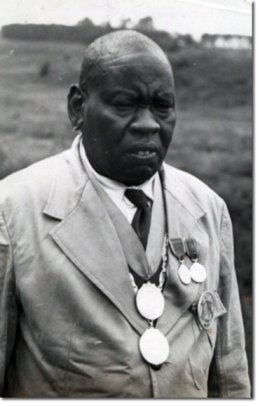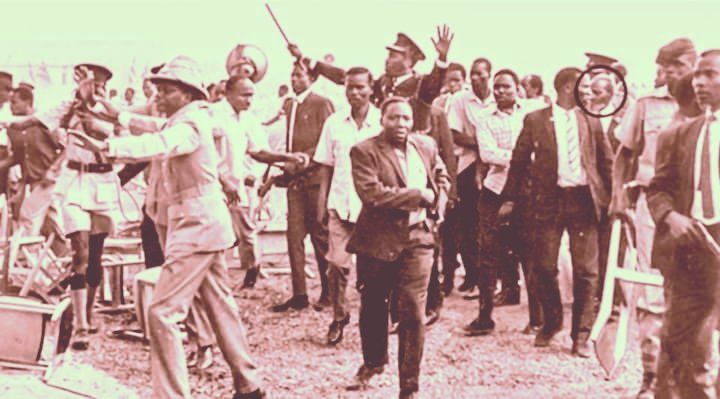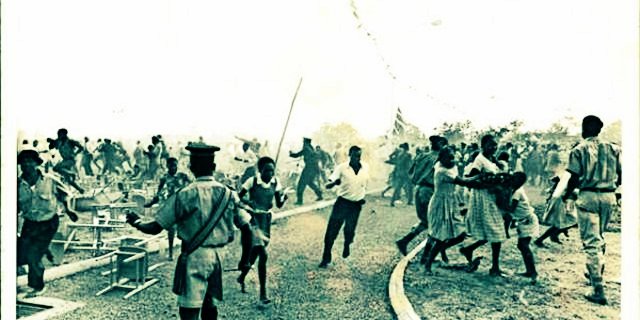
OF THE KAPENGURIA SIX, THE KENYATTA PLOTTED ASSASSINATION THAT FAILED AND LIFE AFTER KAPENGURIA.
The life of the six men after arrest, during their time in prison & detention, the new comer who almost killed Jomo Kenyatta and life after they were released.
***THREAD***.


The life of the six men after arrest, during their time in prison & detention, the new comer who almost killed Jomo Kenyatta and life after they were released.
***THREAD***.



By the year 2000,only 3 of the Kapenguria 6 were alive.Apart from Achieng' Oneko,Paul Ngei & Bildad Kaggia who by then were wallowing in poverty,their former comrades in arms Jomo Kenyatta & Fred Kubai had died while Kung'u Karumba "disappeared" during a business trip 2 Uganda.
Kaggia by that year was seriously sick at his Kandara home in Murang'a while Ngei depended on well-wishers to provide him with shelter after auctioneers evicted him from his city home.
The Kapenguria Six were arrested on October 20, 1952 in the wake of Mau Mau uprising. They were charged with trying to overthrow the colonial government through the Mau Mau movement.
The six were tried at Kapenguria and detained for seven years. Thus the name Kapenguria Six.
The six were tried at Kapenguria and detained for seven years. Thus the name Kapenguria Six.
The six detainee; Jomo Kenyatta, Bildad Kagia, Ramogi Achieng Oneko, Paul Ngei, Fred Kubai and Kungu Karumba, were on trial for six months, from December 1952 to April 1953, found guilty and sentenced to seven years imprisonment with hard labour.
The court room in Kapenguria was too small to accommodate the six, their lawyer and guards, so a school room at an agricultural college, two kilometres from the cells, was used.
Today, the college is known as Chewoyet Secondary School.
Today, the college is known as Chewoyet Secondary School.
The defence was led by lawyer Denis Nowell Pritt (pictured above in frame two and three) and he was assisted by Chaman Lall, Fitz De Souza, Achhroo Ram Kapila, and Jaswant Singh.
The presiding judge was Ransley Thacker, while the main witness was a Kikuyu called Rawson Macharia, who testified that he was forced to take an oath in Kenyatta’s house which required him to strip naked and drink human blood.
After the trial, the six were taken to prison in Lakitaung to serve their sentence. By the time they were being transferred to Lodwar, Mr Oneko had won an appeal but he was separated from the rest and detained in Manyani Prison, near Voi, 310 kilometres east of Nairobi.
While in detention,the animosity btwn Jomo Kenyatta & Mau Mau members is reported to have been so bad that they attempted to kill him by enlisting the services of a young Mau Mau scout,Kariuki Chotara who had been transferred 2 Lokitaung Prison from Manyani after escaping earlier
The young Mau Mau fighter Kariuki Chotara,was to later rise through the political ranks to become a powerful Nakuru District Kanu chairman and nominated MP after Kenyatta's death.
Lokitaung District Commissioner Leslie Whitehouse wrote about the incident & I quote. "...After Pritt departed, Mzee was not only ostracised by his fellow convicts but was subjected unceasingly to vituperation and harassment of every kind. The knife attack was the climax...”
He adds: "The inquiry which followed recorded that a newcomer to the prison, a young man convicted murderer saved from the death sentence by reason of being under 18 years of age set upon Jomo with a knife in the prison but he was prevented by a prison warder..."
Kenyatta's close association with the church which had preached strongly against the Mau Mau movement and the 'special treatment' he was allegedly receiving while at the facility are some of the reasons said to have almost cost him his life.
Some of the Kenyatta critics always wished that Kariuki Chotara mission on that day was a success but Jomo was the proverbial cat with nine lives and he survived that onslaught on his life.
April 1961,Jomo was moved 2 Maralal while the other 4 detainees remained in Lodwar. In Maralal,Kenyatta stayed in a 3 bedroomed house,enjoyed more freedom but was still under house arrest & close watch.He was released & went to Gatundu, Kiambu,just outside Nairobi,on Aug 14, 1961
After detention and following Kenya's independence on December 12, 1963, Kenyatta became the President while the rest save for Karumba, became members of the new Parliament.
Oneko and Ngei were Cabinet ministers while Kaggia and Kubai were assistants.
Oneko and Ngei were Cabinet ministers while Kaggia and Kubai were assistants.
Kaggia was Kandara MP and Assistant Minister for Education in 1963 before he fell out with Kenyatta over the land tenure system.
He advocated the compensation of former Mau Mau fighters. He wanted the government to give Uhuru heroes free land but Kenyatta was opposed to the idea
He advocated the compensation of former Mau Mau fighters. He wanted the government to give Uhuru heroes free land but Kenyatta was opposed to the idea
The President, Mzee Jomo Kenyatta was for willing-seller-willing-buyer policy. He wanted even the Mau Mau who had spent over ten years in the forest to come out of forest and buy the land. Kaggia was sacked in 1964 and lost interest in politics.
Paul Ngei, once a robust politician, by the year 2000 had almost been reduced to a beggar. He moved around in a wheelchair after his legs were amputated to save his life following diabetic complications. The right leg was amputated in 1997 and the other in 1999.
The former minister in both the Kenyatta & Moi govts,variously described as a "man of many lives like a cat',was evicted by auctioneers from his mansion at Garden Estate over an Sh19M debt.
Once a rich man but in 1990 he was declared bankrupt & barred from holding public office.
Once a rich man but in 1990 he was declared bankrupt & barred from holding public office.
In 1966, Kenyatta suspended Ngei as minister to pave the way for a commission of inquiry into the affairs of the Minister following an alleged maize scandal.
In 1974, he lost his Kangundo Parliamentary seat after a petition court found him guilty of election offences but Kenyatta had the Constitution changed to give his former comrade-in-arms a chance to run again.
Ngei was a founder of Kenya African Union (KAU), Kanu's fore-runner. KAU, whose President was James Gichuru. Ngei was the Mackakos branch secretary. He also founder the Africa People's Party in 1962.
Ngei was in the Moi Cabinet until 1988 when he lost his Kangundo Parliamentary seat to Maj (Rtd) Jackson Mulinge.
Fred Kubai was a fighter since his youth.But he died a poor man at the age of 79.worked closely with Kenyatta & the KCA. He was the first chairman of one of the trade union established to fight for the rights of African workers, the Transport & Allied Workers Union (Tawi) in 1949
After independence in 1963, Kubai became Nakuru East MP and appointed an assistant Minister for Labour in the Kenyatta government.
He lost the seat in the 1974 but recaptured the seat in 1983. He retired from active politics in 1988.
He lost the seat in the 1974 but recaptured the seat in 1983. He retired from active politics in 1988.
Though he had been decorated by Kenyatta with the Order of the Burning Spear (OBS) in 1967 & by Moi,with the Elder of the Burning Spear (EBS),Kubai lived a solitary life confined to a wheelchair at his Ngeya Farm in Nakuru. Like Ngei, he had his right leg amputated in Jan 1991.
He died in June1996 at a time a stroke he had suffered cost him his speech. He could only communicate through sign language. Apart from his coffin being draped with the party flag, the government was not represented. Mr Oneko attended the burial of his detention mate.
On release from detention, Karumba opted to do business & shied off politics
He was in transport business but disappeared mysteriously in Uganda at the height of political tension following the murder of JM Kariuki in 1975.His disappearance is yet to be unravelled 51 years later
He was in transport business but disappeared mysteriously in Uganda at the height of political tension following the murder of JM Kariuki in 1975.His disappearance is yet to be unravelled 51 years later
At the time of his arrest in 1952, Oneko was KAU secretary general.
He was editor of Ramogi, a political monthly publication in the Luo language, that used to campaign for KAU.
Upon independence, he became Minister for Information.
He was editor of Ramogi, a political monthly publication in the Luo language, that used to campaign for KAU.
Upon independence, he became Minister for Information.
Kenyatta detained him from 1969 to 1975. He & other leaders of the Opposition Kenyan People's Union (KPU) of former Vice-President Jaramogi Oginga Odinga,were accused of causing riots during Kenyatta's tour of Kisumu town. (The kisumu massacre which I tweeted on 26th of Oct 2020)
Kenyatta had gone there to open Nyanza Provincial Hospital.
Scores of people were killed and injured during the skirmishes.
Scores of people were killed and injured during the skirmishes.
Oneko,Kenyatta's former personal secretary,was the only one of the Kapenguria Six to have suffered detention after independence
The politician romped back to Parliament in 1992 following the re-introduction of multi party system.He was Rarienda MP on until 1997 when he lost.
The politician romped back to Parliament in 1992 following the re-introduction of multi party system.He was Rarienda MP on until 1997 when he lost.
Achieng Oneko, 78, spent a quiet life either in Nairobi or at his rural farm in Uyoma, Rarienda until his death in June 9th 2007. Becoming the last of the kapenguria six.
Jomo Kenyatta, was undoubtedly the luckiest of the Kapenguria Six.He used to say Uhuru na Kazi, meaning there were no free things. That Kenyans, including former freedom fighters, had to toil to own property.
Critics accused him of favouring former colonial homeguards and their offsprings.
They were unhappy his government seemed to have neglected the former freedom fighters and that most top civil service jobs went to those whose parents collaborated with the colonial masters.
They were unhappy his government seemed to have neglected the former freedom fighters and that most top civil service jobs went to those whose parents collaborated with the colonial masters.
• • •
Missing some Tweet in this thread? You can try to
force a refresh


















